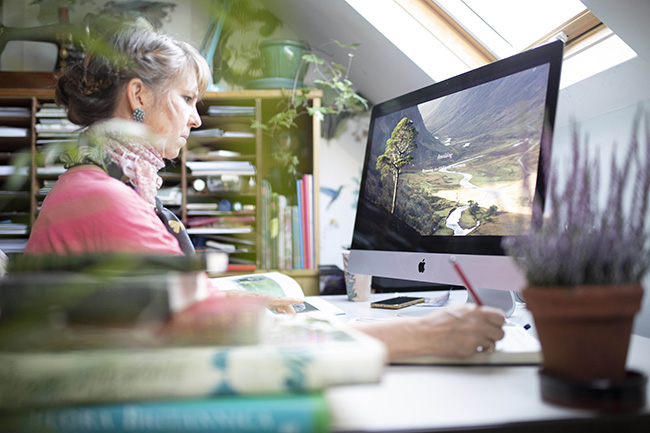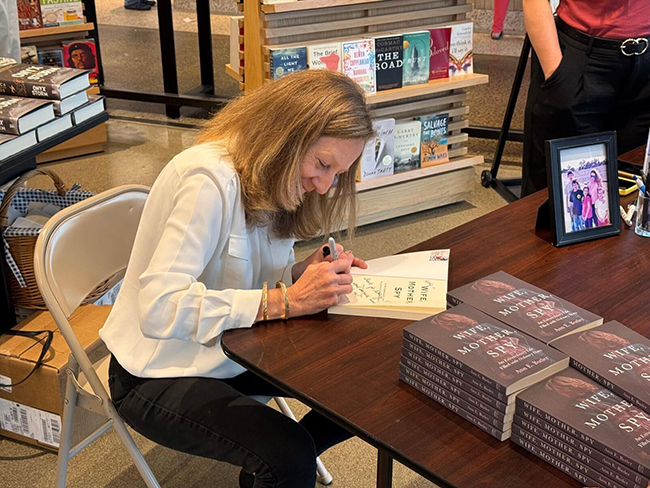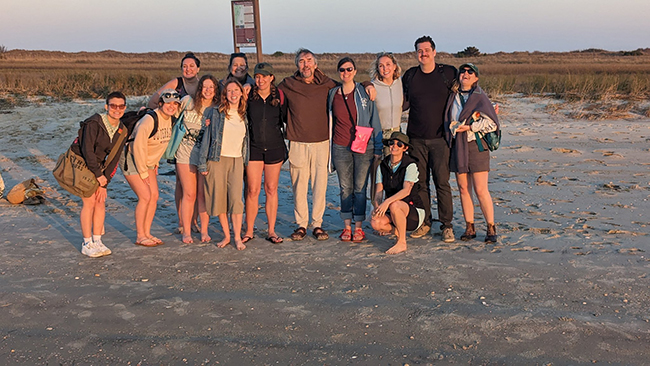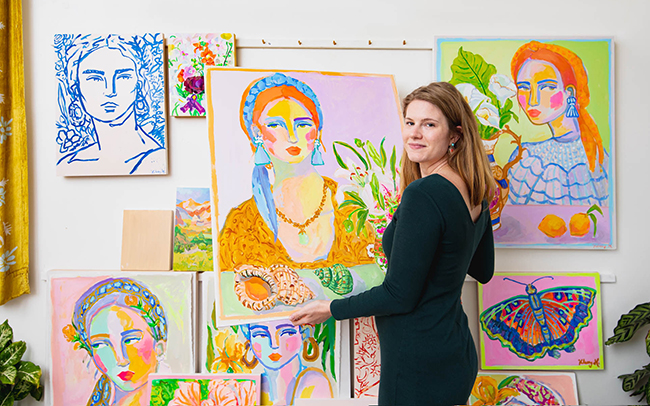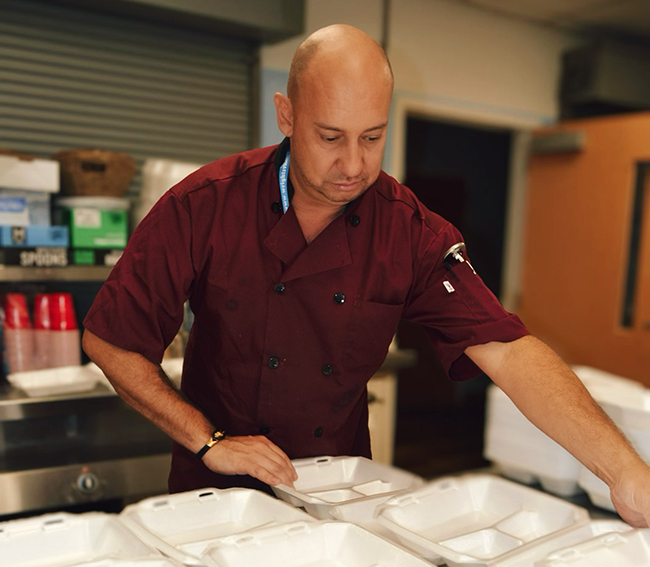Dive In, the Water's Fine
04 May 2024
Local freediving record holder, Ashley Chapman, on finding peace beneath the surface
By Carin Hall » Photos by Ren Chapman
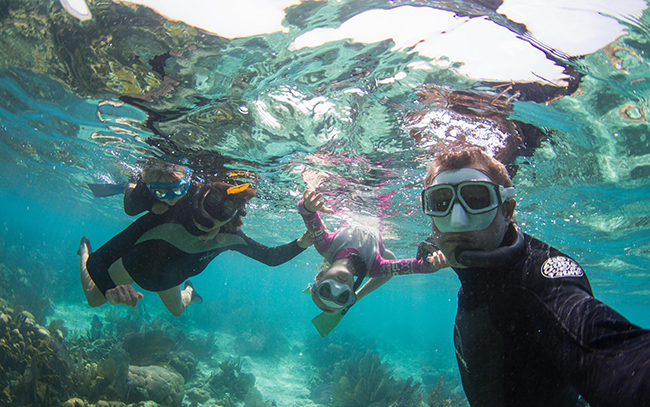
“Freediving is like competitive meditation,” Ashley Chapman explains, a three-time world record holder and 17-time national record holder in the extreme sport.
Several popular documentaries and articles introduce the sport starting at its most outwardly dramatic point—a freediver emerges from the water with a pale blue face, while safety experts yell “BREATHE!” and wait for the diver to either sign OK or need saving from a hypoxic blackout.
But for the diver, the experience is something else. Something otherworldly. Physically and mentally, what does the journey of those five-ish minutes descending and ascending feel like?
The countdown begins, Ashley calms her nerves. “There are so many things that can take you out of that meditative space you need to be in,” she says. “You have to be 100% focused… Once you enter the water, it's all work. And that's one of the ways we manage our fear and discomfort—we busy ourselves with
the process.”
For some, this could mean using a mantra repeating the next step. The hard kick cycles are first: she works to break through the positive buoyancy closer to the surface, a process that consumes a significant portion of oxygen. The pressure changes, she starts equalizing her ears continuously. The soft kick phase follows as it becomes easier to move deeper. Ashley sings to herself to keep a rhythm, “strong pull, two, three, two, three, strong pull, two, three, two, three…” And then the sink phase begins.
“Some people describe this as the best part of the dive,” she says. “I think it's the hardest part because you're not working at all. You're just allowing the ocean to slowly pull you down to depth… it gets intimidating.”
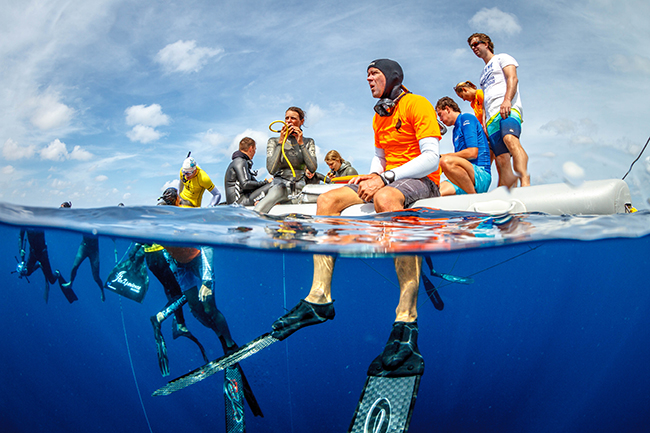
It gets darker, she feels the compression on her lungs and tells herself to remain calm and keep going, letting the ocean pull her further and further down. Finally, she reaches her target depth, grabbing a tag from a plate at the bottom of the tethered line. “That's your signal to kind of mentally wake up and get ready for the hardest part, physically,” she says.
At this point, there's a strong buildup of CO2 in her lungs and it's time to push hard on the ascent against the negative buoyancy hundreds of feet beneath the surface. “For me, this part is easy because any kind of burning sensation in my arms or legs I know is not going to kill me,” she says. “I can handle the discomfort of that… There are no more decisions to be made, and I like that.”
A new mantra enters her mind: keep going, kick, keep going, kick. A safety diver comes into view at around 100 feet from the surface. She feels the contractions of an uncontrollable desire to breathe. Ignore that, almost there, keep working, keep going, kick. Another safety diver appears. She breaks through the surface into a shockingly different environment.
“After having been in complete solitude and silence for that long, it's very disorienting,” she explains. Lightheaded, she does a series of breath exercises to readapt and maintain her blood pressure. She flashes an OK symbol with her hand, receiving a white card (a qualified pass) from the judges, and everybody erupts into cheers and applause. “The reward is worth everything,” she says.
AN UNLIKELY SUCCESS
What's remarkable about Ashley's journey into the sport is that it didn't occur to her to pursue until she suddenly discovered that she had some talent for it later on. She didn't grow up as avid of a “water person” as her husband Ren, a freediving safety expert and skilled spearfisher. Plus, her parents were worry warts anytime they visited the beach and she attempted to v
enture out.
“I would say confusion probably clouded my experience,” she recalls of her young relationship with the water. That all changed when she met Ren. “Then the water started to represent a frontier, freedom, that kind of thing.”
The couple took a freediving class on a trip together shortly after she finished her undergrad at UNCW. Ashley noticed how much more experienced most participants were but, pushing aside some initial feelings of imposter syndrome, she had great success from the start. That's part from practice and athleticism, part having the mental capacity for it. She adds a few more advantages: time, a sailboat to live on, a supportive and water-obsessed partner, and no kids yet.
“We decided to sell all our things, get the boat and sail around—we got really into it,” she says. “Not everyone has the flexibility to do that. Being in the water all the time afforded me the opportunity to train and keep progressing.”
For several years they did what it took to get by that way, living simply and doing what they love.
Eventually, their two children Ani and Cape came along, and they started their own business to share their passion with others. Still nursing her youngest, the kids witnessed their mom set her most recent record in 2019. “It's a great way to kind of wrap up a really intense 10-year period of record attempts,” she says. “I'm not saying I'll never do another record,
but it would require a lifestyle change for us to get back out there and hit it.”
During the pandemic, their presence in the Cape Fear region was especially valuable as an interest in getting outside surged. “A big dose of mother nature is always a good bet,” Ashley says. Much like they'd seen from the earlier days of their relationship, the outdoors industry proved itself to be both recession and pandemic-proof.

EVOLVE WILMINGTON
Ready to give it a try? Don't worry, there's no pressure to compete. According to the Chapmans, the water and the benefits it has to offer are truly for everyone, regardless of age or ability (minus of course anyone with a serious health condition). The most important rule is to never freedive alone and ideally do it with professionally trained safety experts.
Given their unique background and expert knowledge, Ashley and Ren run and operate Evolve Freediving in Wilmington. Their classes range from swim lessons for littles to varying levels of freediving and spearfishing courses, special workshops, and remote coaching. While a lot of locals have an interest in spearfishing, teaching others about the mental elements of breathwork is Ashley's favorite part.
“Not only do we teach breathing rhythms to get people deeper and make them more comfortable in the water,” she says, “but we're getting more people interested in the mindfulness aspect.”
She's seen firsthand the positive impact it can have on people struggling with depression, addiction, or just the daily stresses of life. It's also something you can do as you get older, Ashley insists, referencing Natalia Molchanova, one of the most decorated female freedivers who set records into her 50s. (Note: she died freediving and her body was never found. I repeat, do not dive alone).
Evolve accepts divers into their classes ages 12 and up. Of course, the rules don't apply to their own children, who've been dunking in the water since they were babies. (Ani is already diving down 33 feet at just 10 years old). The introductory freediving class maxes out at 66 feet, depending on individual goals. The first focus is on safety, followed by technique and putting it into practice. Ren and another instructor run the spearfishing courses and although a freediving class is not a prerequisite, it's highly encouraged.
“You'll have a lot more fun if you master some basics of freediving and breathwork first,” Ashley says. While there are no guarantees, “we often take people from holding their breath from one minute to four minutes,” she adds. “It's just technique.”
As a decently healthy and active woman in her mid-30s only mildly fearful of the ocean, I still hesitate, to which Ashley says, “Then you're the perfect person for the class!” I'll report back…
“If nothing else, it's really nice to put yourself in a situation where you're completely out of your comfort zone for just a moment, where your focus is singular,” she continues. “When you're in the pool trying to hold your breath as long as you can, you're not thinking anymore… You're able to just be in the moment for a little while. And that's a gift in this noisy, noisy environment we live in.”

